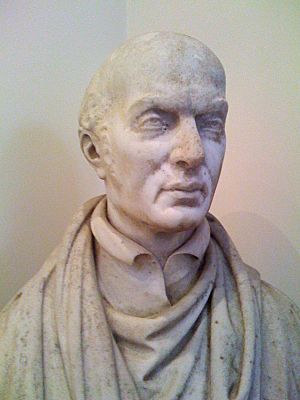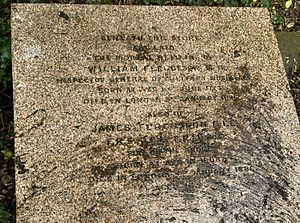William Fergusson (physician) facts for kids
Dr. William Fergusson (1773–1846) was a Scottish doctor who worked as an inspector-general for military hospitals. He also wrote many important medical papers.
Contents
Life of William Fergusson
William Fergusson was born in Ayr, Scotland, on June 19, 1773. He came from a well-known local family. He studied medicine at Edinburgh University and later at hospitals in London.
In 1794, he became an assistant surgeon in the army. He served in many places, including Holland, the West Indies, the Baltic Sea area, and the Iberian Peninsula (Spain and Portugal). He also took part in an expedition against Guadeloupe in 1815.
His Role in the Battle of Copenhagen
Fergusson was present at the Battle of Copenhagen in 1801. He was a staff surgeon with Admiral Lord Nelson on the ship Elephant. After the battle, he was in charge of taking the wounded British soldiers to Yarmouth.
He earned his medical degree (MD) from St Andrews University in 1812.
Life After the Army
After leaving the army in 1817, Fergusson started his own medical practice in Edinburgh. He became a Fellow of the Royal Society of Edinburgh in 1818. This is a special honor for people who have made important contributions to science and knowledge.
In 1821, he moved to Windsor at the request of the Duke of Gloucester. He had worked with the Duke for twenty years. In Windsor, he became a very successful doctor. He continued his work until 1843, when he became ill and could no longer practice.
William Fergusson passed away on January 19, 1846. He is buried with his son, James Fergusson, in Highgate Cemetery in London. His personal papers are kept at the library of University of Yale.
William Fergusson's Writings
William Fergusson wrote many papers about military medicine. He also contributed original work to the Edinburgh Medical and Surgical Journal. Some of his papers were read at the Royal Society of Edinburgh.
After his death, his son published a collection of his papers called Notes and Recollections of a Professional Life. This book included not only medical papers but also some of his thoughts on military tactics.
Understanding Malaria
One of Fergusson's most important essays was about the "marsh poison" theory of malarial fever. This theory suggested that malaria was caused by bad air from swamps. He wrote about his experiences with soldiers in Holland, Portugal, and the West Indies. He noticed that malaria often appeared in dry, rocky areas, not just swamps. This observation helped scientists understand that rotting plants were not the only cause of the disease.
Even though he didn't fully connect malaria to mosquitoes, he was one of the first to suggest that insects might carry diseases like the plague.
 | William Lucy |
 | Charles Hayes |
 | Cleveland Robinson |



